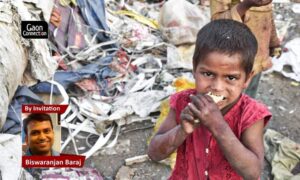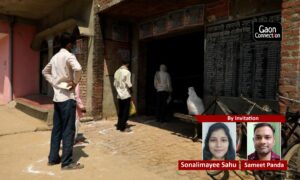My name is Hashma Khatun and I am a ward member in Tinkoni panchayat, East Champaran district, Bihar. As a ward member since 2016, I am responsible for ward number three and work under the mukhiya (panchayat head) of the gram panchayat. For the last five years, I have also been part of the Centre for Catalysing Change’s (C3) Champion Paryojana, which mentors elected women panchayat leaders and builds their capacity to carry out their duties.
Tinkoni is a small panchayat of approximately 10,000 people, and is located 163 km away from the state capital, Patna. People here are mostly engaged in agriculture, labour, and other small businesses such as poultry farming and fish rearing.
There have been no cases of COVID-19 in our village so far. We have remained aware and alert in our panchayat, and are following the lockdown strictly. We have to fight this disease, and defeat it at any cost. As ward members, we are asking people to maintain cleanliness, not to visit each other’s houses, not to crowd at public places or host events, and to only visit the markets during the assigned hours to purchase essentials. We have also distributed soap and masks, arranged for disinfectant sprays, and quarantined people who came into the village from outside. We have been careful not to let COVID-19 enter our village. “Jab sarkar ne 50 pratishat aarakshan dekar hame mauka diya hai, toh ab samay hai sarkar ke nirnay ko sahi saabit karne ka” (The government has reserved 50 per cent seats for women in panchayats, and now is the time for us women leaders to prove that the decision was correct).
Before this pandemic hit, our panchayat had been working on getting water taps installed, building toilets, starting anganwadi centres, ensuring parents were sending their daughters to school and not marrying them early, and so on. During the lockdown, all our regular activities have stopped, and we are trying to help the community in other ways. We have had six deliveries during the lockdown, and as ward members, we have tried to help where we can. This includes taking the pregnant women to the hospital, getting the birth certificates made, and so on. We also visit homes in the village and explain the situation to people. But we ensure that we always have our masks on, and if we have to talk to people, we call them to the door of their house, instead of going in.
10.30 AM: I go out to make rounds in my ward and check if anybody is facing any problems, or if anybody is breaking the lockdown rules. I see some people playing cricket, even though we banned such activities. We made a rule which says that anybody violating the lockdown will have to pay a fine of INR 50,000 or spend three months in jail. Unfortunately, people don’t get scared unless they are threatened.
I try to break up the group and make them go home, but they don’t listen to me. As a local leader, sometimes people will listen to me, sometimes they don’t. So, I threaten to call the police if they don’t leave. I also remind them to think about their families, and tell them that if they carry in the virus from outside, it could spread to the entire community. After hearing that, they give in, and leave for their homes.
12 PM: I talk to some people who have started work under MGNREGA, and tell them to wear masks and maintain a distance of two metres while working. The two or four kilograms of foodgrains that people are receiving are not enough, but if there is work, people can earn and eat. Thankfully, we got an order from the block development officer (BDO) a few days ago to start work under MGNREGA. Many in the village have started working, and we ensure they follow the necessary precautions.
2 PM: I speak on the phone with some ward members. We discuss the problems that people are facing in Tinkoni, and what we can do about them. One issue that comes up is that although the government is distributing foodgrains, only those with a ration card are eligible. However, there are many in our village without a ration card, and even those with the card are not getting enough foodgrains.
We take the issue up with our mukhiya, who decides to buy ration from his own money and distribute it among those who need it in the village.
5.30 PM: Someone tells me that a person has come to the village from outside, and is staying at home instead of at the quarantine centre. Immediately, I go to their house and put up a poster which says that they cannot stay at their home for 14 days, and need to go to the quarantine centre.
As soon as the lockdown was announced, our panchayat converted a local school into a quarantine centre for people coming back to the village. In total, 82 people came into the village and were made to stay at the school for 14 days. They were segregated based on where they had come from—those who came from Delhi were made to stay separately from those who came from Nepal, and so on.
Those 82 people have now returned to their homes after they were checked by a doctor. Anybody coming in after that is required to stay quarantined at a centre in the block, outside the village.
8 PM: An ASHA didi informs me about a pregnant woman, Rani Kumari*, in the village who needs immediate medical attention. ASHA didis have been finding it difficult to work alone during the lockdown, and so ward members have been supporting them.
The government hospital’s ambulance is busy with another patient, so we have to find another way to take Rani to the hospital nearby. We manage to find an autorickshaw driver, but he is unwilling to take us. Both the ASHA didi and I plead with him and try to make him understand the seriousness of the situation. Finally, he agrees.
At the government hospital, the doctor says the baby is stuck, and that delivery will not be possible without a C-section. He refers us to the Sadar hospital—a government hospital which is 38 km away. Because of the distance, we decide not to go to Sadar hospital, and take her to a nearby private hospital instead.
By this time, it is quite late in the night, but our troubles do not end here. On the way to the private hospital, we are stopped at multiple police checkpoints that are there to enforce the lockdown. They only let us go when we plead with them and tell them that we need to take Rani to the hospital to save her life. Meanwhile, my son, who was bringing us food, was stopped by the police too. He is fined INR 1,000.
Finally, Rani successfully delivers a baby girl. The panchayat agrees to help the family with the hospital bill. I return home and make sure to take a bath before entering my house. I have four sons and a daughter, and need to protect my own family from the disease too.
*Name changed to maintain confidentiality. As told to IDR.
Hashma Khatun is a ward member from the Tinkoni panchayat, East Champaran district, Bihar. As a ward member, she works towards improving the health services available at the panchayat- and block-level, along with supporting work around pensions, road construction, and sanitation.
This article has been sourced from India Development Review. You can read the original article here.


















